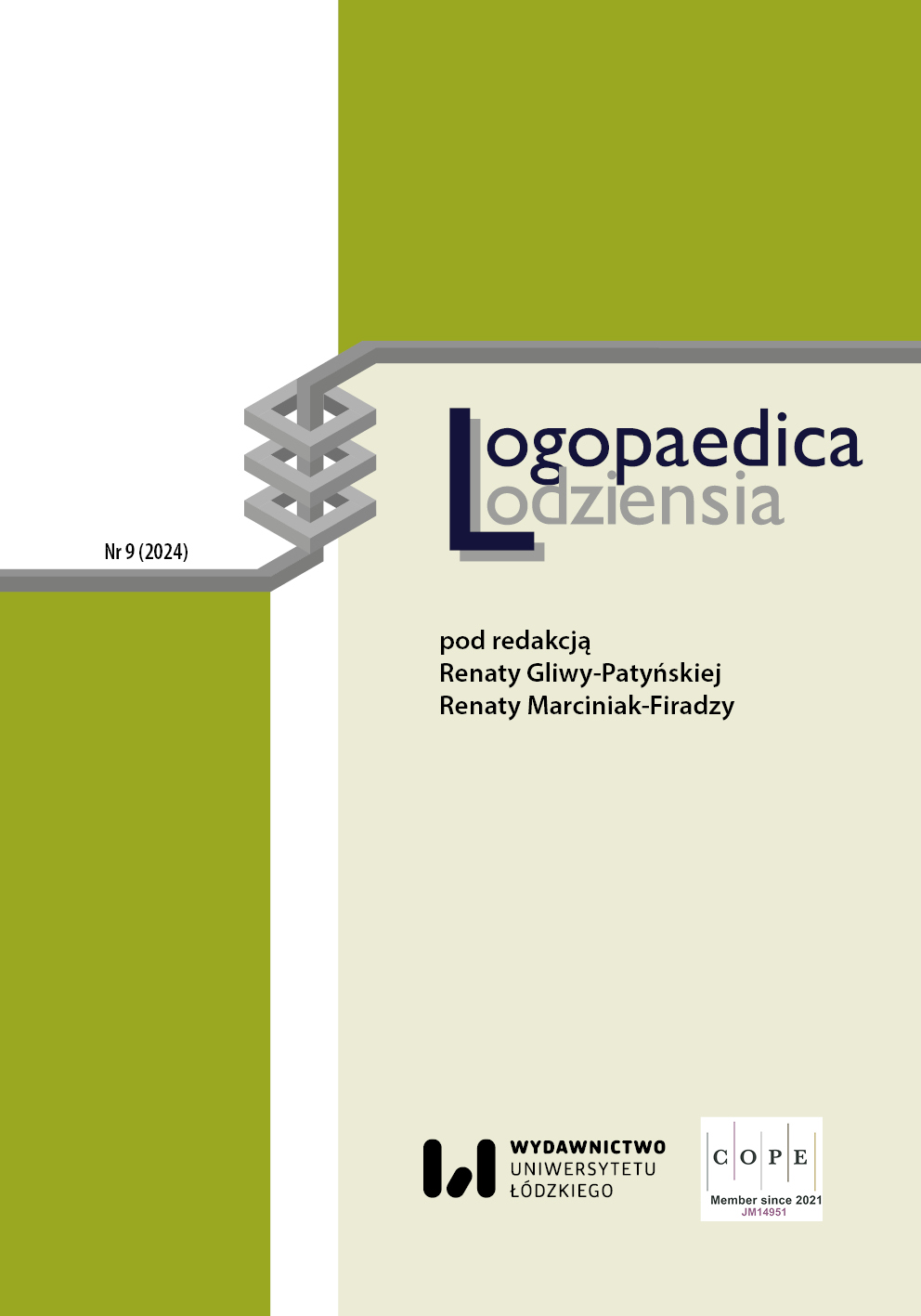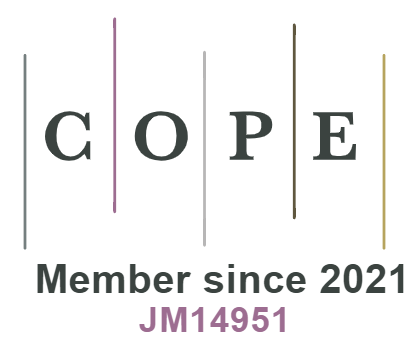Mindfulness: The Use of Mindfulness Practice in the Therapy of Adults with Cluttering and Stuttering
DOI:
https://doi.org/10.18778/2544-7238.09.02Keywords:
mindfulness, cluttering, stuttering, therapyAbstract
In recent years, the growing interest in mindfulness has extended beyond the social sciences to include speech therapy. Research indicates that regular application of Mindfulness‑Based Interventions (MBI) offers significant benefits to individuals suffering from depression, cancer, chronic pain, and generalized anxiety disorders. There is also an increased interest in incorporating mindfulness training into the therapeutic practice for adults with stuttering and cluttering. For professionals, it is essential not only to understand the concept of mindfulness but also to engage in regular mindfulness practice.
The article is divided into three parts. The first one introduces the theoretical foundations of mindfulness. The second part reviews scientific studies that demonstrate how mindfulness practice in stuttering therapy can reduce avoidance behaviors, improve emotional regulation, and enhance acceptance. The final section provides practical mindfulness exercises and outlines how they can be incorporated into the therapy for individuals with stuttering and cluttering.
It is extremely important to conduct further research on the integration of mindfulness into therapeutic interventions, particularly for adults with speech disorders, such as stuttering and cluttering.
Downloads
References
Baer R.A., 2003, Mindfulness training as a clinical intervention: A conceptual and empirical review, „Clinical Psychology: Science and Practice”, Vol. 10, s. 125–143.
Google Scholar
DOI: https://doi.org/10.1093/clipsy/bpg015
Baer R.A., Smith G.T., Allen K.B., 2004, Assessment of mindfulness by self‑report: the Kentucky inventory of mindfulness skills, „Assessment”, Vol. 11(3), s. 191–206.
Google Scholar
DOI: https://doi.org/10.1177/1073191104268029
Becker D.R., Shelly S., Kavalieratos D., Maira C., Gillespie A.I., 2022, Immediate Effects of Mindfulness Meditation on the Voice, „Journal of Voice: Official Journal of the Voice Foundation”, https://doi.org/10.1016/j.jvoice.2022.10.022
Google Scholar
DOI: https://doi.org/10.1016/j.jvoice.2022.10.022
Bohlmeijer E., Prenger R., Taal E., Cuijpers P., 2010, The effects of mindfulness‑based stress reduction therapy on mental health of adults with a chronic medical disease: A meta‑analysis, „Journal of Psychosomatic Research”, Vol. 68(6), s. 539–544, https://doi.org/10.1016/j.jpsychores.2009.10.005
Google Scholar
DOI: https://doi.org/10.1016/j.jpsychores.2009.10.005
Boyle M.P., 2011, Mindfulness training in stuttering therapy: A tutorial for speech‑language pathologists, „Journal of Fluency Disorders”, Vol. 36(2), s. 122–129, https://doi.org/10.1016/j.jfludis.2011.04.005
Google Scholar
DOI: https://doi.org/10.1016/j.jfludis.2011.04.005
Center for Nonviolent Communication, b.r., https://www.cnvc.org (dostęp: 10.12.2023).
Google Scholar
Chambers R., Lo B.C., Allen N.B., 2008, The impact of intensive mindfulness training on attentional control, cognitive style, and affect, „Cognitive Therapy and Research”, Vol. 32, s. 303–322.
Google Scholar
DOI: https://doi.org/10.1007/s10608-007-9119-0
Emge G., Pellowski M.W., 2019, Incorporating a Mindfulness Meditation Exercise Into a Stuttering Treatment Program, „Communication Disorders Quarterly”, Vol. 40(2), s. 125–128.
Google Scholar
DOI: https://doi.org/10.1177/1525740118783516
Faściszewska M., Tuchowska J., 2018, Narzędzia diagnostyczne stosowane w ocenie postaw i zachowań dorosłych osób jąkających się – możliwości zastosowania w polskiej logopedii, [w:] K. Węsierska (red.), Zaburzenia płynności mowy, Gdańsk: Wydawnictwo Harmonia Universalis, s. 158–174.
Google Scholar
Guitar B., 2006, Stuttering: An integrated approach to its nature and treatment, Baltimore: Lippincott Williams and Wilkins.
Google Scholar
Gupta S., Yasodharakumar G.Y., Vasudha H.H., 2016, Cognitive Behavior Therapy and Mindfulness Training in the Treatment of Adults Who Stutter, „The International Journal of Indian Psychology”, Vol. 3, s. 78–87.
Google Scholar
DOI: https://doi.org/10.25215/0303.010
Harris R., 2018, Zrozumieć ACT. Terapia akceptacji i zaangażowania w praktyce, Sopot: Gdańskie Wydawnictwo Psychologiczne.
Google Scholar
Hayes S.C., 2020, Umysł wyzwolony. Zakończ wewnętrzną walkę i żyj w zgodzie ze sobą, Sopot: Gdańskie Wydawnictwo Psychologiczne.
Google Scholar
Hayes S.C., Luoma J.B., Bond F.W., Masuda A., Lillis J., 2006, Acceptance and Commitment Therapy: Model, processes and outcomes, „Behaviour Research and Therapy”, Vol. 44(1), s. 1–25, https://doi.org/10.1016/j.brat.2005.06.006
Google Scholar
DOI: https://doi.org/10.1016/j.brat.2005.06.006
Hoge E.A., Bui E., Mete M., Dutton M.A., Baker A.W., Simon N.M., 2023, Mindfulness‑Based Stress Reduction vs Escitalopram for the Treatment of Adults With Anxiety Disorders: A Randomized Clinical Trial, „JAMA Psychiatry”, Vol. 80(1), s. 13–21, https://doi.org/10.1001/jamapsychiatry.2022.3679
Google Scholar
DOI: https://doi.org/10.1001/jamapsychiatry.2022.3679
Jha A.P., Krompinger J., Baime M.J., 2007, Mindfulness training modifies subsystems of attention, „Cognitive, Affective, and Behavioral Neuroscience”, Vol. 7, s. 109–119.
Google Scholar
DOI: https://doi.org/10.3758/CABN.7.2.109
Kabat‑Zinn J., 2003, Mindfulness‑based interventions in context: Past, present, and future, „Clinical Psychology: Science and Practice”, Vol. 10(2), s. 144–156, https://doi.org/10.1093/clipsy.bpg016
Google Scholar
DOI: https://doi.org/10.1093/clipsy/bpg016
Kabat‑Zinn J., 2020, Gdziekolwiek jesteś, bądź. Przewodnik uważnego życia, Warszawa: Wydawnictwo Czarna Owca.
Google Scholar
Kabat‑Zinn J., 2021, Życie, piękna katastrofa. Mądrością ciała i umysłu możesz pokonać stres, choroby, ból, Warszawa: Wydawnictwo Czarna Owca.
Google Scholar
Leonard M., 2019, Uważność społeczna jako siła napędzająca zmiany, https://www.mindfully.pl/artykul/uwaznosc‑spoleczna‑jako‑sila‑napedzajaca‑zmiany (dostęp: 10.12.2023).
Google Scholar
Linehan M.M., 1993, Cognitive‑behavioral treatment of borderline personality disorder, New York: Guilford Press.
Google Scholar
McDonald M., b.r., RAIN: The Nourishing Art of Mindful Inquiry, https://learn.tricycle.org/p/rain (dostęp: 10.12.2023).
Google Scholar
Mongia M., Gupta A.K., Vijay A., Sadhu R., 2019, Management of stuttering using cognitive behavior therapy and mindfulness meditation, „Industrial Psychiatry Journal”, Vol. 28(1), s. 4–12, https://doi.org/10.4103/ipj.ipj_18_19
Google Scholar
DOI: https://doi.org/10.4103/ipj.ipj_18_19
Myers F., 2016, Giełkot (bez)ładny labirynt, https://www.konferencja‑zpm.edu.pl/wp‑content/uploads/2016/09/F_Myers_handout_PL.pdf (dostęp: 10.12.2023).
Google Scholar
Plexico L.W., Manning W.H., Levitt H., 2009, Coping responses by adults who stutter. Part I. Protecting the self and others, „Journal of Fluency Disorders”, Vol. 34, s. 87–107.
Google Scholar
DOI: https://doi.org/10.1016/j.jfludis.2009.06.001
Roca P., Vazquez C., Diez G., McNally R.J., 2023, How do mindfulness and compassion programs improve mental health and well‑being? The role of attentional processing of emotional information, „Journal of Behaviour Therapy and Experimental Psychiatry”, Vol. 81, 101895.
Google Scholar
DOI: https://doi.org/10.1016/j.jbtep.2023.101895
Segal Z.V., Williams J.M.G., Teasdale J.D., 2002, Mindfulness‑based cognitive therapy for depression: A new approach to preventing relapse, New York: Guilford Press.
Google Scholar
Sønsterud H., 2021, Terapia akceptacji i zaangażowania (ACT) i jej zastosowanie w terapii jąkania, [w:] K. Węsierska, H. Sønsterud, Dialog bez barier – kompleksowa interwencja w jąkaniu. Wydanie polskie rozszerzone, Chorzów: Wydawnictwo Agere Aude, s. 407–428.
Google Scholar
Starkweather C.W., 1993, Issues in the efficacy of treatment for fluency disorders, „Journal of Fluency Disorders”, Vol. 18, s. 151–168.
Google Scholar
DOI: https://doi.org/10.1016/0094-730X(93)90004-N
Szerszeńska A., 2019, Akceptacja w jąkaniu. Zastosowanie ACT i uważności w terapii logopedycznej, „Forum Logopedy”, nr 31, s. 35–40.
Google Scholar
Veer S. de, Brouwers A., Evers W., Tomic W., 2009, A Pilot Study of the Psychological Impact of the Mindfulness‑Based Stress‑Reduction Program On People Who Stutter, „European Psychotherapy”, Vol. 9(1), s. 39–56.
Google Scholar
Ward D., 2018, Stuttering and Cluttering: Frameworks for Understanding and Treatment, Oxon–New York: Routledge.
Google Scholar
Williams J.M.G., 2010, Mindfulness and psychological process, „Emotion”, Vol. 10(1), s. 1–7.
Google Scholar
DOI: https://doi.org/10.1037/a0018360
Williams M., Penman D., 2014, Mindfulness. Trening uważności, Warszawa: Wydawnictwo Samo Sedno.
Google Scholar
Zylowska L., Ackerman D.L., Yang M.H., Futrell J.L., Horton N.L., Hale T.S., Pataki C., Smalley S.L., 2008, Mindfulness Meditation Training in Adults and Adolescents with ADHD: A Feasibility Study, „Journal Attention Disorder”, Vol. 11(6), s. 737–746, https://doi.org/10.1177/1087054707308502
Google Scholar
DOI: https://doi.org/10.1177/1087054707308502
Downloads
Published
How to Cite
Issue
Section
License

This work is licensed under a Creative Commons Attribution-NonCommercial-NoDerivatives 4.0 International License.












